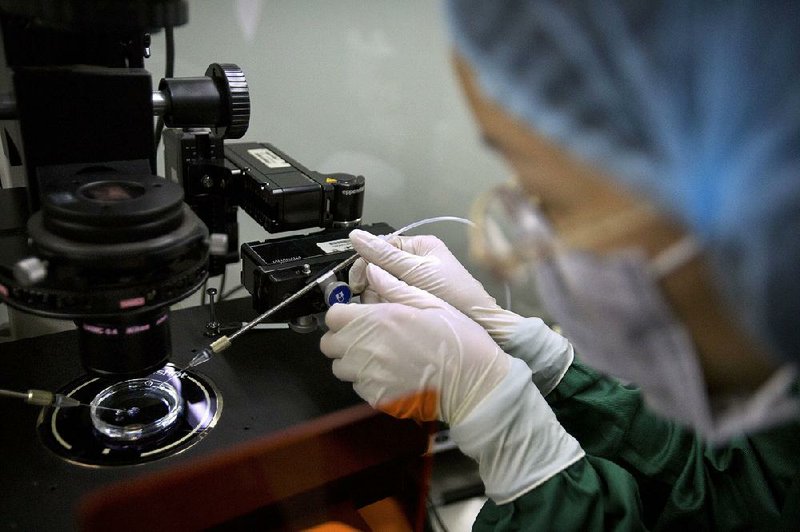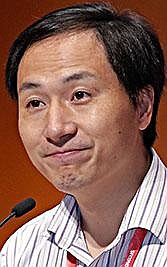HONG KONG -- China's government ordered a halt Thursday to work by a medical team that claimed to have helped make the world's first gene-edited babies, as a group of leading scientists declared that it's still too soon to try to make permanent changes to DNA that can be inherited by future generations.
Xu Nanping, the vice minister of science and technology, told state broadcaster China Central Television that his ministry is strongly opposed to the efforts that reportedly produced twin girls born earlier this month. Xu called the team's actions illegal and unacceptable and said an investigation had been ordered, but made no mention of specific actions taken.
Researcher He Jiankui claims to have altered the DNA of the twins to try to make them resistant to infection with the AIDS virus. Mainstream scientists have condemned the experiment, and universities and government groups are investigating.
He's experiment "crossed the line of morality and ethics adhered to by the academic community and was shocking and unacceptable," Xu said.
A group of leading scientists gathered in Hong Kong this week for an international conference on gene editing, the ability to rewrite the code of life to try to correct or prevent diseases.
Although the science holds promise for helping people already born and studies testing that are underway, a statement issued Thursday by the 14-member conference leaders says it's irresponsible to try it on eggs, sperm or embryos except in lab research because not enough is known yet about its risks or safety.
The conference was rocked by the Chinese researcher's claim to have helped make the world's first gene-edited babies. Conference leaders called for an independent investigation of the claim by He, who spoke to the group Wednesday as international criticism of his claim mounted.
He acknowledged he had not made his university in China aware of the research he was doing. He said he initially paid for the research himself, then later from his university funding.
He pushed back against suggestions that he had been secretive about his work, saying that he had presented preliminary aspects of it at conferences and consulted with scientists in the United States and elsewhere. He said he had submitted his research to a scientific journal for review and had not expected to be presenting it at the conference.
There is no independent confirmation of what He says he did. He was scheduled to speak again at the conference on Thursday, but he left Hong Kong and through a spokesman sent a statement saying "I will remain in China, my home country, and cooperate fully with all inquiries about my work. My raw data will be made available for third party review."
Robin Lovell-Badge, a professor of genetics and embryology at the Francis Crick Institute in London who moderated the Wednesday session, said in an email that "it would have been difficult to have sufficient security" for a second talk. Lovell-Badge said that He decided not to attend after he was told about the security arrangements.
Lovell-Badge said Thursday that the organizers had felt it was "important to give He a platform to present what he had done."
"We therefore do not regret at all allowing him to present yesterday, but giving him a second opportunity today might also have been viewed as support for him," he said. "This is another reason the committee did not want him back today."
Several prominent scientists said the case showed a failure of the field to police itself and the need for stricter principles or regulations.
"It's not unreasonable to expect the scientific community" to follow guidelines, said David Baltimore, a Nobel laureate from California Institute of Technology who led the panel.
There already are some rules that should have prevented what He says he did, said Alta Charo, a University of Wisconsin lawyer and bioethicist and a conference organizer.
"I think the failure was his, not the scientific community," Charo said.
Gene editing for reproductive purposes might be considered in the future "but only when there is compelling medical need," with clear understanding of risks and benefits, and certain other conditions, said Dr. Victor Dzau, president of the U.S. National Academy of Medicine, one of the conference sponsors.
"Not following these guidelines would be an irresponsible act," he added.
Other sponsors of the three-day conference are the Academy of Sciences of Hong Kong, the Royal Society of the United Kingdom and the U.S. National Academy of Sciences.
Information for this article was contributed by Marilynn Marchione of The Associated Press; and by Sui-Lee Wee of The New York Times.
A Section on 11/30/2018

